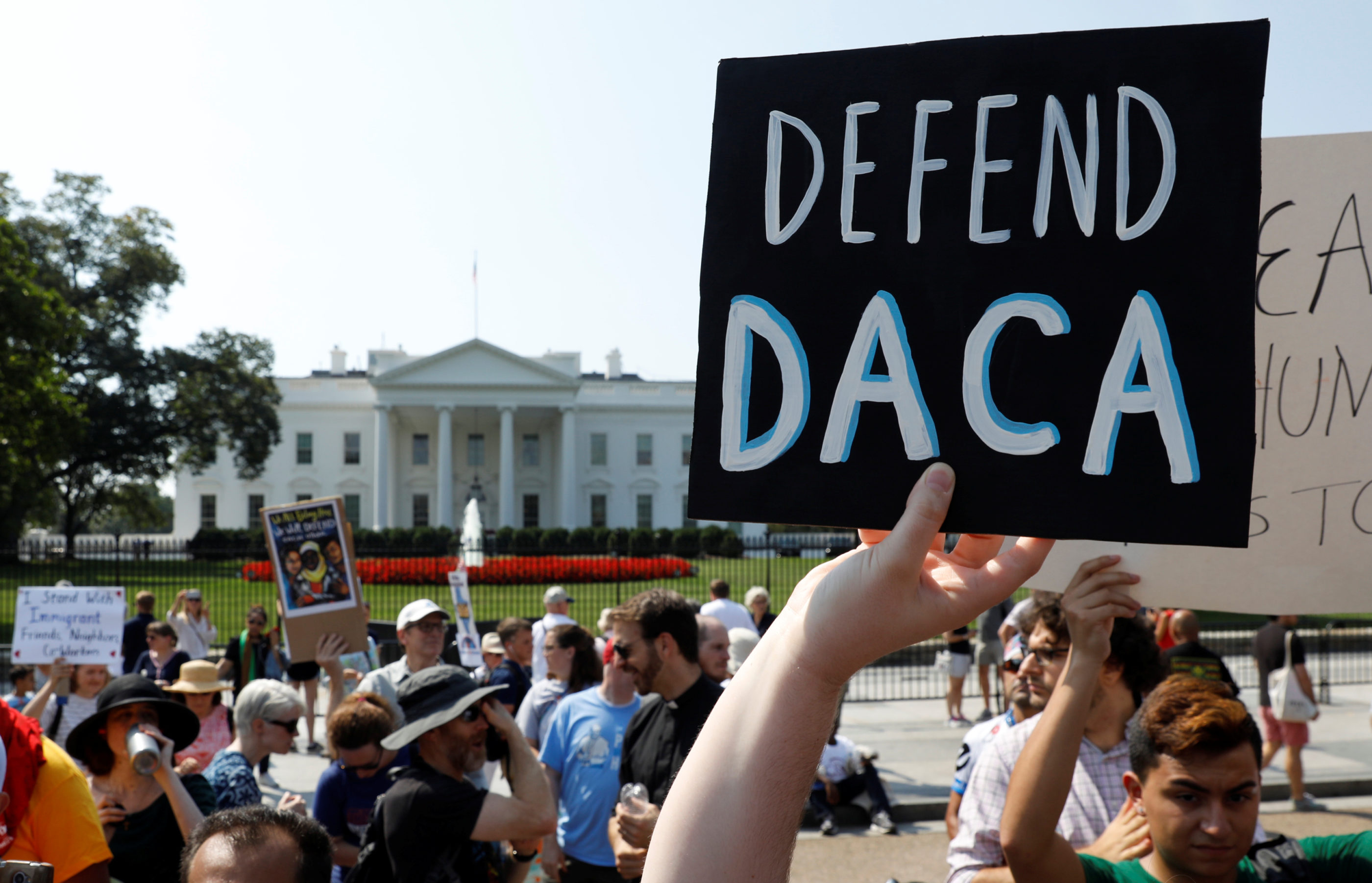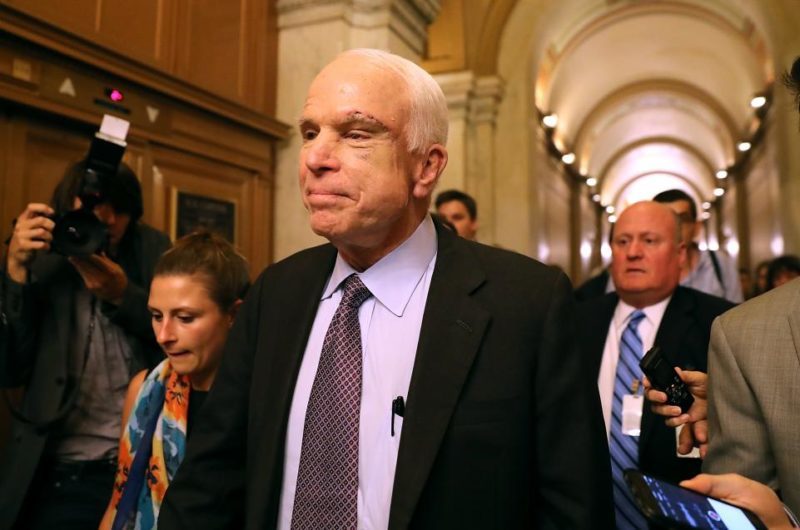By Alexander Andresian*
Two weeks ago, President Trump formally announced the beginning of the end of the Deferred Action for Childhood Arrivals (DACA) program.[1] Put in place by the Obama Administration, the DACA program granted work permits to, and deferred the deportation of, the children of undocumented immigrants (herein referred to as “Dreamers”) brought to the United States at a young age.[2] The announcement served as a reminder of the Trump Administration’s capacity for unspeakable cruelty and its willingness to erode the American ideals of fairness and justice in the pursuit of political gamesmanship.
During his announcement, Attorney General Sessions proffered three main justifications for ending the DACA program. The first following the logic that “the law is the law”[3] and therefore the law should be enforced. The second is that DACA hurts American economic interests. The third is that DACA violates the separation of powers implied in the U.S. Constitution. All three justifications, I argue, are incredibly facile and serve only to obfuscate the Trump Administration’s intention to use the livelihood of hundreds of thousands of Dreamers as a political bargaining chip.
The first argument—“the law is the law”[4]—is intellectually and historically dishonest. Laws are important. But laws do not always equal justice.[5] Should the Court’s decision in Dred Scott have been left at “the law is the law?”[6] What about Plessey v. Ferguson?[7] How about the institution of slavery?[8] These were all legal; they were also all immoral.[9] The law as it currently stands allows for the deportation of young adults who were brought to America by their parents, oftentimes as toddlers. We do not hold minors to the same standard as adults in most aspects of criminal law. Why do we do so with immigration? Using “the law” qua moral absolute heuristic seems to only achieve one purpose, namely, giving illiberal decision-making a veneer of legitimacy.
Another argument is that DACA hurts American economic interests. In fact, Attorney General Sessions claimed that “[DACA] denied jobs to hundreds of thousands of Americans by allowing those same jobs to go to illegal aliens.”[10] This claim is demonstrably false. Dreamers “outpac[e] the general population in terms of business creation.”[11] If anything, this leads to the opposite conclusion: Dreamers create jobs, not “deny” them.
The third argument is that President Obama’s DACA policy is indefensible on the grounds that it violates the constitutional separation of powers. However, the power of the executive to exercise discretion on these matters is well known. In fact, the Reagan Administration used its own discretion to protect the children of undocumented immigrants who qualified under the Immigration and Control Act, even though the law did not explicitly cover these children.[12] The claim that conferring some form of protective status to a category of individuals constitutes unconstitutional executive overreach conveniently overlooks actions taken by a lionized member of the president’s own party.
The Trump Administration’s disjointed reasoning for rescinding DACA gives heavy credence to the theory that President Trump’s true intention is to callously risk the livelihoods of Dreamers to extract concessions from Congress to achieve his xenophobic campaign platform (e.g., the Wall). His eagerness to work with Senate Minority Leader Schumer and Minority Leader Pelosi to trade a DACA-replacement for increased border security similarly shows his cards.[13]
What will happen with DACA? Nobody knows for sure. But actions have nevertheless been taken to challenge President Trump’s disgraceful decision to end it. Fifteen state attorneys general (as well as the District of Columbia) have already sued the Trump Administration on the grounds that the President’s prior statements and actions indicate that his decision was informed by racial malice.[14] Politicians on both sides of the aisle have also expressed that ending DACA was the wrong decision.[15]
There are many avenues through which litigation, federalism, and advocacy can help to stymie the Trump Administration’s decision to end DACA, but nothing is as certain to improve the lives of the undocu+ community[16] as formal congressional action. Moreover, there are millions of other members of the undocu+ community that do not qualify for DACA. Passing the DREAM Act is certainly a good start, but we need comprehensive immigration reform and we need it now.[17]
*Alexander Andresian is a 3L at Harvard Law School
[1] The DACA program is set to end after a 6-month delay and DACA recipients are allowed to renew their status up until October 5th, 2017. President Trump has set this delay to give Congress time to act.
[2] See Catherine E. Shoichet, Susannah Cullinane, and Tal Kopan, U.S. Immigration: DACA and Dreamers Explained, CNN (Sept. 5th, 2017, 4:21 PM), http://www.cnn.com/2017/09/04/politics/daca-dreamers-immigration-program/index.html.
[3] Daishi Miguel Tanaka, Because the Law is the Law, ACLU of Southern California (Aug. 28th, 2017), https://www.aclusocal.org/en/the-law-is-the-law.
[4] See Daishi Miguel Tanaka, supra note 3.
[5] Id. (“But the law is not justice.”).
[6] See Daishi Miguel Tanaka, infra note 8.
[7] Id.
[8] I would like to credit Daishi Takana, a student at Harvard College and Dreamer, for raising this line of reasoning at Harvard College Act on a Dream’s Fight for Immigrant Rights Rally on September 5th, 2017; Daishi Miguel Tanaka, Because the Law is the Law, ACLU of Southern California (Aug. 28th, 2017), https://www.aclusocal.org/en/the-law-is-the-law (citing Jose Antonio Vargas of Define American).
[9] See Daishi Miguel Tanaka, supra note 8.
[10] Ryan Teague Beckwith, ‘We Cannot Admit Everyone.’ Read a Transcript of Jeff Sessions’ Remarks on Ending the DACA Program, Time (Sept. 5th, 2017), http://time.com/4927426/daca-dreamers-jeff-sessions-transcript/.
[11] Tom K. Wong et al., DACA Recipients’ Economic and Educational Gains Continue to Grow, Center for American Progress (Aug. 28th, 2017, 9:01 AM), https://www.americanprogress.org/issues/
immigration/news/2017/08/28/437956/daca-recipients-economic-educational-gains-continue-grow/.
[12] Mark Noferi, When Reagan and GHW Bush Took Bold Executive Action on Immigration, The Hill (Oct. 10th, 2014, 12:00pm), http://thehill.com/blogs/congress-blog/foreign-policy/219463-when-reagan-and-ghw-bush-took-bold-executive-action-on (“Immigration and Naturalization Service (INS) commissioner Alan Nelson announced he was “exercising the Attorney General’s discretion” to assure that children would “be covered” by legalization. The administration granted a blanket deferral of deportation (logistically similar to today’s Deferred Action for Childhood Arrivals program) for children under 18 who were living in a two-parent household with both parents legalizing, or with a single parent who was legalizing.”).
[13] Maggie Haberman & Yamiche Alcindor, Pelosi and Schumer Say They Have Deal with Trump to Replace DACA, The New York Times (Sept. 13, 2017), https://www.nytimes.com/2017/09/13/us/politics/trump-dinner-schumer-pelosi-daca-obamacare.html?mcubz=0.
[14] Matt Zapotosky, Attorneys General from 15 States, D.C. Sue to Save DACA, The Washington Post (Sept. 6th, 2017), https://www.washingtonpost.com/world/national-security/attorneys-general-from-15-states-dc-sue-to-save-daca/2017/09/06/98bca3b2-930f-11e7-aace-04b862b2b3f3_story.html?utm_term=.a478ddf3fe02.
[15] See, e.g., John McCain (@SenJohnMcCain), Twitter (Sept. 5th, 2017 8:46 AM), https://twitter.com/senjohnmccain/status/905094796003430401?lang=en.
[16] The term “undocu+” is an all encompassing term that refers not just to undocumented individuals, but also their families, many of whom are comprised of individuals who are both documented and undocumented.
[17] I would like to express my gratitude to my colleagues, Michael Adame and Jacob Glick, for their suggestions and edits to this piece.



